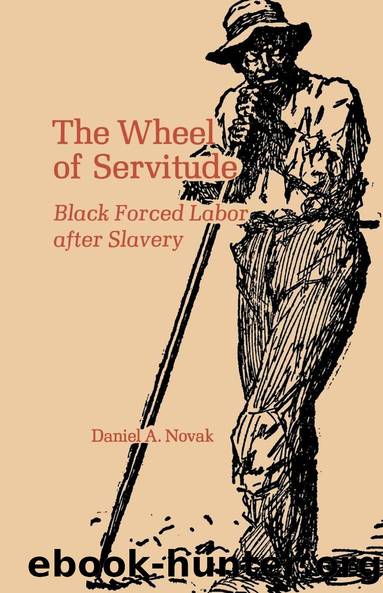The Wheel of Servitude by Daniel A. Novak

Author:Daniel A. Novak [Novak, Daniel A.]
Language: eng
Format: epub
Tags: Social Science, Ethnic Studies, American, African American & Black Studies, Political Science, Labor & Industrial Relations, History, United States, State & Local, South (AL; AR; FL; GA; KY; LA; MS; NC; SC; TN; VA; WV), Discrimination
ISBN: 9780813182148
Google: 9AQaEAAAQBAJ
Publisher: University Press of Kentucky
Published: 2021-09-15T02:49:35+00:00
6
After Bailey
Thus it appears that Cook was arrested . . . solely on account of his failure to comply with his contract. . . . Even if this is true . . . defendants cannot be convicted . . . of peonage.
Taylor v. U.S. (1917)
The decision in Bailey v. Alabama had been hailed as a marked step forward in the battle against peonage. By Ray Stannard Baker it was seen as a second Dred Scott case, a start for a great push against an obnoxious practice. It was confidently expected that similar statutes on the books of other states would now be declared invalid and that sinister operation of the peonage system would soon cease.1
However, several factors militated against this happy result. First among these was the fact that only one sort of peonage law had been declared unconstitutionalâthe sort containing the presumptive evidence clause. A state that dropped this clause, or did not have it, could still prosecute debtors for accepting advances fraudulently. (As an additional fillip, since the Alabama rule of evidence regarding the defendantâs testimony had played a significant part in the Bailey decision, the state courts could still distinguish their statutes from the Alabama law on that basis.)
Further, the only sort of peonage which had been attacked was that which involved debt, âthe basal fact of peonageâ in the narrow definition given to it by the Supreme Court. There were other sorts of forced labor, closely akin to this, which were not covered by this definition. Assistant Attorney General Russell had anticipated this problem as far back as 1907 and had suggested passage of a new law forbidding âinvoluntary servitude and all attempts at it,â abandoning use of the word peonage altogether.2 This advice had not been taken by the Congress. No attack had been made on the labor-enticement laws either, and these remained untouched by the flurry of federal anti-peonage activities.
Perhaps more important, the push behind the federal governmentâs interest in the area was dissipated. With the election of Woodrow Wilson as president, the emphasis placed on peonage by Roosevelt and Taft was shifted to other areas. Complaints of peonage were still received, but few prosecutions were brought. It is doubtful that Georgia, for instance, would have been able to âfinesseâ the Bailey decision without the indifference of the federal government. Perhaps the neglect was âbenignâ in nature, from the governmentâs point of view; a noncontemporary can never know. Certainly, the effect was notâfrom the viewpoint of the helpless black laborer.
None of this should be taken to indicate that the decisions of the Supreme Court had had no effect. Alabamaâs laws had, of course, been struck down. Within months the legislature had placed a new law on the books, but without a âpresumptive evidenceâ section. South Carolina, in an apparent response to Bailey, dropped its presumption clause. In Mississippi and North Carolina the state courts declared their respective laws unconstitutional.3 It should be clear that none of these actions really reduced peonage; they simply made
Download
This site does not store any files on its server. We only index and link to content provided by other sites. Please contact the content providers to delete copyright contents if any and email us, we'll remove relevant links or contents immediately.
The Secret History by Donna Tartt(19092)
The Social Justice Warrior Handbook by Lisa De Pasquale(12191)
Thirteen Reasons Why by Jay Asher(8912)
This Is How You Lose Her by Junot Diaz(6889)
Weapons of Math Destruction by Cathy O'Neil(6281)
Zero to One by Peter Thiel(5802)
Beartown by Fredrik Backman(5756)
The Myth of the Strong Leader by Archie Brown(5509)
The Fire Next Time by James Baldwin(5447)
How Democracies Die by Steven Levitsky & Daniel Ziblatt(5219)
Promise Me, Dad by Joe Biden(5154)
Stone's Rules by Roger Stone(5088)
A Higher Loyalty: Truth, Lies, and Leadership by James Comey(4964)
100 Deadly Skills by Clint Emerson(4926)
Rise and Kill First by Ronen Bergman(4790)
Secrecy World by Jake Bernstein(4753)
The David Icke Guide to the Global Conspiracy (and how to end it) by David Icke(4720)
The Farm by Tom Rob Smith(4514)
The Doomsday Machine by Daniel Ellsberg(4490)
